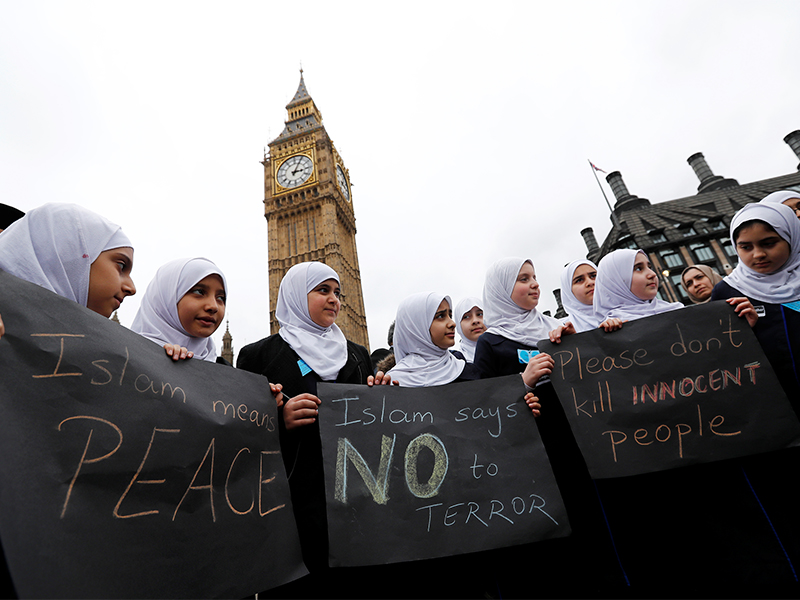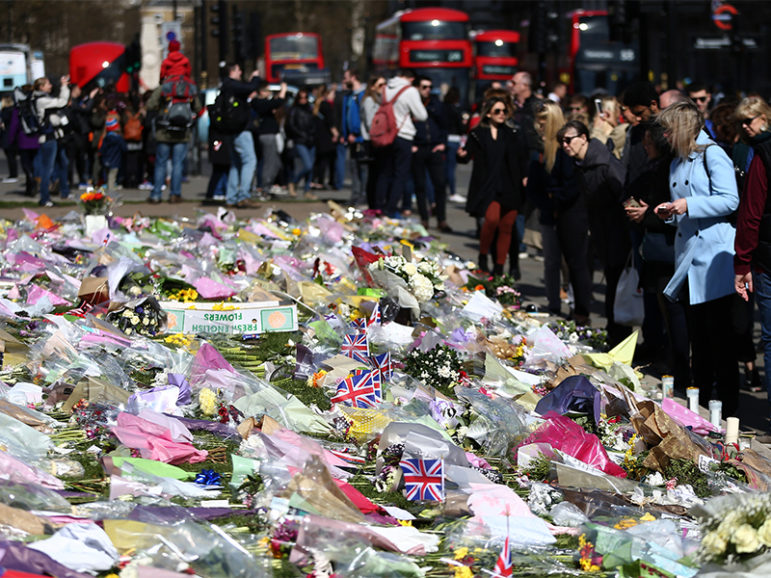LONDON (RNS) A long mound of roses, bouquets and Union Jacks — arranged neatly on the sidewalk — stretches toward the gates of Parliament.
They’ve been brought there by Britons and visitors since the March 22 attack on Westminster Bridge, in which a terrorist drove a car into pedestrians, killing three and injuring dozens, and fatally stabbed a police officer.
The tribute outside Westminster Palace, the seat of Parliament, suggests that many Britons perceive the attack as an assault on democracy itself.
“We stand together in the face of those who seek to harm us and our way of life,” Sadiq Khan, London’s mayor, said in a video after the attack.
[ad number=“1”]
The mayor said that the atrocity highlighted through its victims what a diverse city Britain’s capital has become. The dead and injured included a British national of Spanish extraction, a tourist from Utah, as well as people from France, South Korea and Romania and schoolchildren from Liverpool.
Khan said “terrorists … hate the fact that here in London Christians, Jews, Muslims, Sikhs, Buddhists, Hindus — those who are part of organized faith and those who aren’t — don’t simply tolerate each other, we respect each other.”
Khan, a Muslim, represents the contemporary diversity of Britain and particularly its capital, and the extent to which people of faiths other than Christianity have become prominent, and accepted, figures in British society.
And yet Britain is not entirely a nation at ease with its diversity.
“Islamophobia is our last blind spot,” said Sayeeda Warsi, who was Britain’s first Muslim Cabinet minister.

Muslim girls hold posters on Westminster Bridge on March 29, 2017, during an event to mark one week since a man drove his car into pedestrians and then stabbed a police officer in London. Photo courtesy of Reuters/Stefan Wermuth
Twenty-five years ago, it was race and nation of origin that was controversial in Britain.
In 1990, during the Thatcher era, Norman Tebbit, a prominent Thatcherite lieutenant, proposed a “cricket test” for immigrants — a suggestion that people coming from some Commonwealth nations supported their native countries’ cricket teams rather than the English team of the very English summer sport.
After the Sept. 11, 2001, attacks in the United States and then the July 7, 2005, bombings in London, all perpetrated by Islamic jihadists, religion became the issue for some in Britain.
[ad number=“2”]
Khan himself passes the cricket test, and then some. The son of a Pakistani bus driver, he grew up in the working-class London suburb of Tooting and then worked as a solicitor before running for office. He left the House of Commons to campaign for election as mayor in 2016.
The first Muslim mayor of a Western capital, he has been vocal about improving community relations and has suffered opprobrium from both extremists from his own faith and the British far-right. As well as being open about his Sunni Muslim identity, Khan also speaks regularly of his patriotism, appearing at a football match last weekend supporting the England team.
But memories are long. Ever since the London bombings, in which suicide bombers killed 52 people and injured 700 on three Tube trains and a bus, it is noticeable that the last empty seat in a carriage is always the one next to a Muslim carrying a rucksack.
[ad number=“3”]
Warsi, who served as minister for faith and communities under former Prime Minister David Cameron, said British Muslims suffer hostility all the time.
“Islamophobia is socially acceptable,” she said.
Warsi has just published a book, “The Enemy Within,” in which she recounts tales of anti-Muslim prejudice but is optimistic, given that previous enemies within, such as Roman Catholics, have now been assimilated into British society. The downside, though, is that assimilation took 300 years from the English Reformation to Catholic emancipation.
Warsi argues that the British government’s Prevent strategy, first introduced by Labour in 2003 and which orders all public-sector workers such as doctors and teachers to prevent people being drawn into terrorism, is counterproductive and alienates Muslims.
She told The Sunday Times in an interview a few days before the latest attack that the way Muslims are treated is “McCarthyistic.”
“What Muslims see is daily vilification. They’re sick to death of this giant LED spotlight following them around everywhere,” she said.
Rather than Islam causing terrorism, said Warsi, those who engage in it already have convictions, are alienated from their families or are confused about their sexuality.
Two of these at least were true of Khalid Masood, a convert to Islam who drove the car used in the Westminster attack and who was shot dead by a policeman after the attack.
Born Adrian Elms, Masood grew up in the Kent town of Tunbridge Wells — a byword for middle-class gentility and affluence. His life was not entirely conventional, though: Born out of wedlock in the 1960s to a white mother by a black father, he later took the Ajao surname of his stepfather.
He was alienated from his family. And by the age of 18 he had reportedly begun a life of criminality, including knife attacks, and entered the prison system, which has become a hotbed of Islamist radicalization in Britain.
He had links to both Birmingham and Luton, centers of Islamist radicalization, but contacts of his have said they had no inkling of him becoming Islamist.
Back at Westminster Bridge, a different version of Muslim Britain was on view several days ago, when a group of Muslim women, most wearing the hijab, held hands all along the bridge to mark solidarity with the victims.
“When an attack happens in London, it is an attack on me,”Sarah Waseem, 57, was quoted as saying. “It is an attack on all of us. Islam totally condemns violence of any sort. This is abhorrent to us.”





